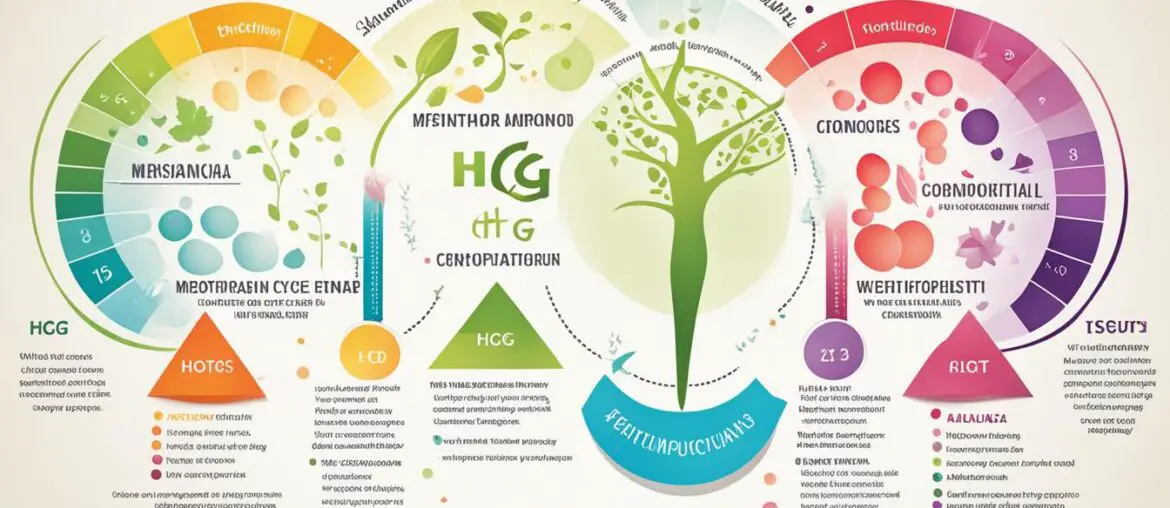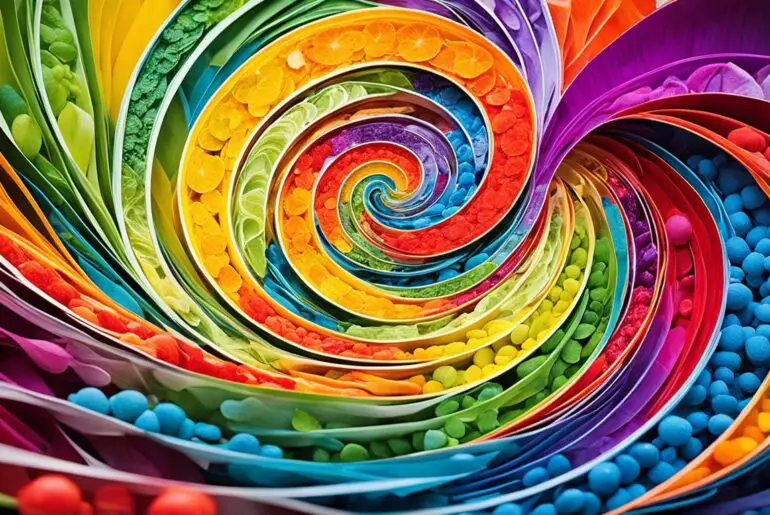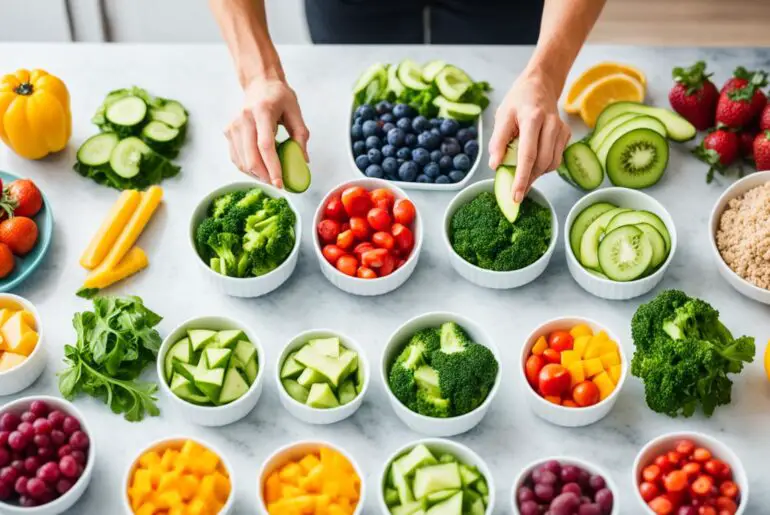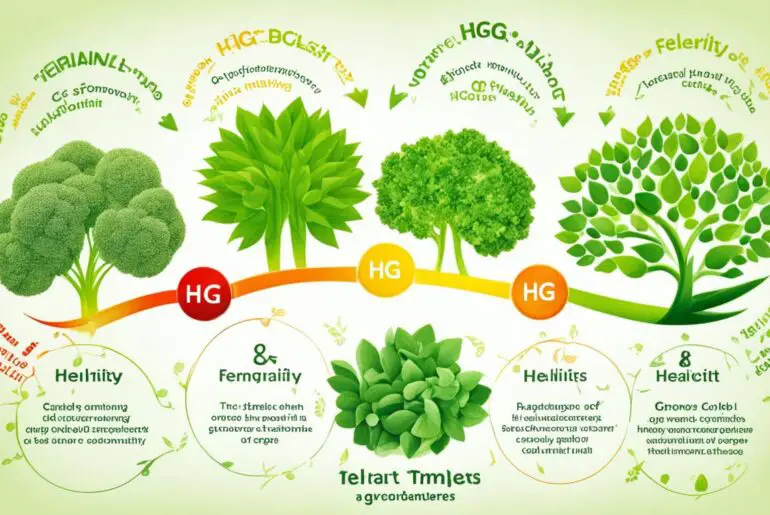Have you ever wondered how the HCG Diet can impact your menstrual cycle? Does it really affect your hormones and menstrual health? Let’s explore the fascinating relationship between the HCG Diet and the female menstrual cycle to understand the potential effects and considerations.
Key Takeaways:
- The HCG Diet may cause changes in the regularity, flow, and duration of the menstrual cycle.
- Some individuals choose to continue taking HCG throughout their menstrual period without adverse effects.
- Weight loss may slow down during menstruation due to water retention, but it will resume as the period ends.
- Consulting with a healthcare professional is important if any concerns arise regarding the HCG Diet and menstrual cycle.
- Monitoring your menstrual cycle and adjusting the diet accordingly can help optimize results while on the HCG Diet.
The Impact of Hormones on Menstruation
The start and end of menstruation are controlled by hormones known as the Luteinizing Hormone (LH) and the Follicle Stimulating Hormone (FSH). These hormones are produced in the pituitary gland and are responsible for maturing the ovaries and regulating the menstrual cycle. During menstruation, the levels of LH and FSH change, which can affect the effectiveness of the HCG hormone in promoting weight loss.
It is recommended to stop taking HCG during menstruation to ensure the hormone’s optimal impact on weight loss.
When LH and FSH levels fluctuate, it can influence menstrual regularity and other considerations related to the cycle. These hormonal changes may affect how the body responds to HCG, potentially impacting weight loss results. Therefore, it is crucial to pay attention to hormonal fluctuations and adjust the HCG protocol accordingly.
| Hormone | Role in Menstruation |
|---|---|
| Luteinizing Hormone (LH) | Controls the release of the egg from the ovary (ovulation) and stimulates the production of progesterone. |
| Follicle Stimulating Hormone (FSH) | Assists in follicle development and estrogen production. |
How Hormonal Fluctuations Affect Weight Loss
During menstruation, the hormone levels are in a state of flux, which can impact weight loss. This is because the hormonal changes can affect the body’s metabolism and fluid balance. For optimal weight loss results, it is advisable to pause the HCG protocol during menstruation, allowing the body’s hormones to stabilize.
By understanding the connection between hormonal changes and menstruation, individuals following the HCG Diet can make informed decisions about when to pause or continue the HCG hormone. Consulting with a healthcare professional can provide personalized guidance based on individual hormonal considerations.
Continuing HCG During Menstruation
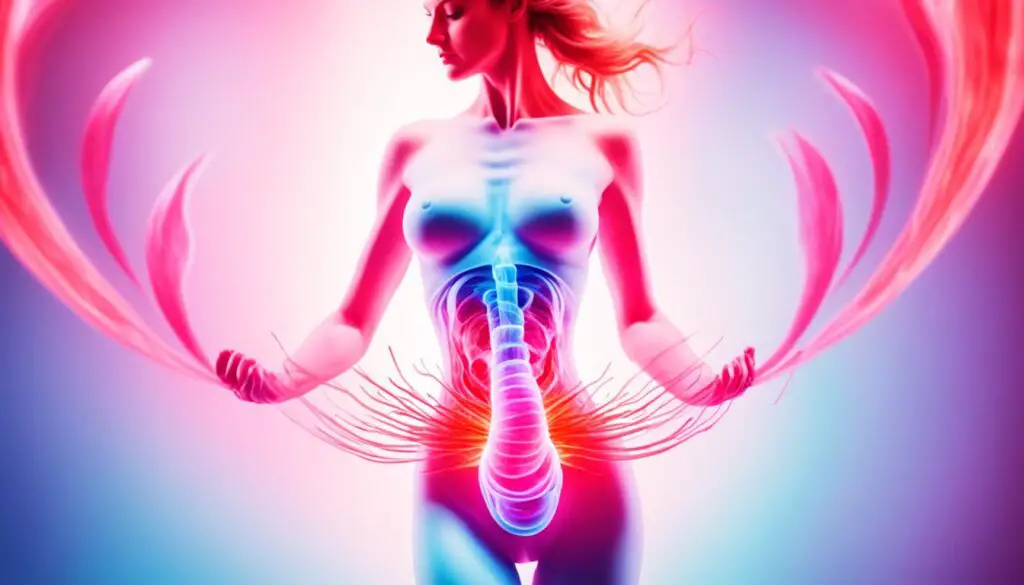
Although it is generally recommended to stop taking HCG during menstruation, many individuals choose to continue using the hormone throughout their period without experiencing any adverse effects. Some people may only pause their HCG supplementation on heavy flow days, typically during the first two or three days of their menstrual cycle.
It is important to note that hunger may persist during menstruation even when not taking HCG. However, resuming the hormone after the period can alleviate hunger quickly. Therefore, it is advisable to resume the HCG diet phase as soon as the menstrual period ends to prevent extreme hunger.
HCG Dosage During Menstruation
When continuing with HCG during menstruation, it is essential to maintain the appropriate dosage. The recommended HCG dosage is typically 125 to 150 International Units (IU) per day, regardless of whether you are menstruating or not. It is crucial to follow your healthcare provider’s guidance or the dosing instructions provided by a reputable HCG program.
Managing Hunger during Menstruation
Hunger may be a challenge during menstruation, regardless of HCG usage. However, if hunger becomes overwhelming, it is advisable to consult with your healthcare provider or an HCG specialist for additional guidance. These professionals can provide helpful strategies to manage hunger and ensure that your diet remains on track during this time.
Resuming HCG After the Menstrual Period
After the menstrual period concludes, it is crucial to resume HCG supplementation to maintain the momentum of the HCG diet. Resuming the hormone after the period helps to mitigate hunger and supports continued weight loss progress. Please remember to consult with your healthcare provider or follow the recommendations of your chosen HCG program to ensure proper timing and dosage.
Dosage Guidance
| Phase | Dosage |
|---|---|
| HCG Diet Phase | 125 to 150 IU per day |
| Menstrual Period | Continue the same dosage |
| Resuming after the Period | Continue the same dosage |
HCG Diet and Menstrual Cycle Changes
The HCG Diet can have an impact on the regularity and characteristics of the menstrual cycle. Even individuals who usually have regular periods may experience changes while following the HCG protocol. These changes can include early or late periods, alterations in menstrual flow (heavier or lighter), shorter or longer periods, and even spotting during the cycle. It’s important to monitor these changes and consult with a healthcare professional if any concerns arise.
Some women may notice that their periods become earlier or delayed while on the HCG Diet. This variation in menstrual timing can be attributed to hormonal fluctuations caused by the diet protocol.
In addition to changes in timing, the HCG Diet may also affect the flow of menstrual blood. Some women may experience heavier or lighter flow than usual during their periods while on the diet.
Furthermore, the duration of the menstrual cycle may be different for individuals following the HCG Diet. Some women may have shorter periods, while others may experience longer ones.
Spotting, which refers to light bleeding or the presence of small amounts of blood between periods, may also occur during the HCG Diet. This spotting can happen at any point during the cycle and should be closely monitored.
It’s essential to keep track of these menstrual cycle changes and consult a healthcare professional to ensure the overall health and well-being during the HCG Diet.
| Changes in Menstrual Cycle on the HCG Diet | Implications |
|---|---|
| Early or late periods | May indicate hormonal fluctuations caused by the HCG Diet. |
| Changes in menstrual flow (heavier or lighter) | Can be a result of the HCG Diet’s impact on hormones. |
| Shorter or longer periods | Duration of the menstrual cycle may be affected by the HCG Diet. |
| Spotting during the cycle | Light bleeding or small amounts of blood between periods may occur. |
Effects of Menstruation on Weight Loss
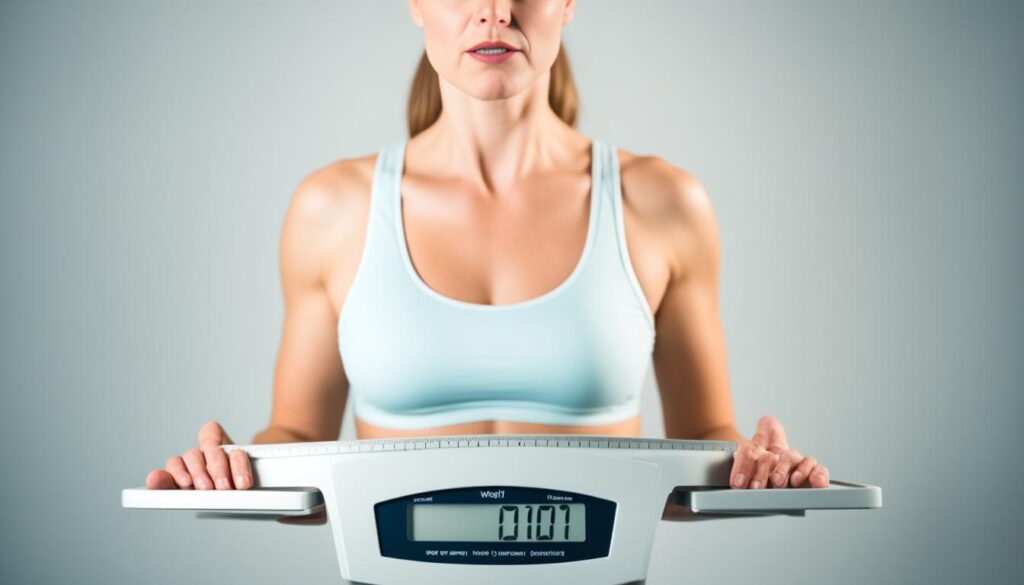
During the menstrual period, weight loss may slow down for a couple of days before and during menstruation. This temporary slowdown is mainly due to water retention rather than fat gain. It’s important to understand that any weight gain experienced during this time is likely to be temporary and related to water retention, not actual fat accumulation. As the period ends, weight loss will resume, and the body will return to its normal state.
When menstruating, it’s crucial to remain patient and consistent with the HCG Diet. Remember that these fluctuations in weight are common and expected, so there’s no need to panic or deviate from the diet plan. Stick to the protocol, continue following the recommended calorie intake, and focus on your long-term goals.
To mitigate the effects of water retention during menstruation, it’s essential to stay hydrated and maintain a balanced diet. Adequate hydration helps to flush out excess fluid and reduce bloating. Additionally, consuming foods with diuretic properties, such as cucumber, lemon, and watermelon, can also assist in minimizing water retention.
Overall, weight loss during menstruation may be slower, but remain confident in the effectiveness of the HCG Diet. Remember that temporary fluctuations are part of the journey, and consistency will yield the desired results.
HCG and Pregnancy Tests
If you suspect that you might be pregnant while on the HCG Diet, it’s important to follow the appropriate steps to ensure accurate results. If a person becomes pregnant while on the HCG Diet, it is recommended to immediately stop taking HCG. Continuing the diet with HCG while pregnant can have potential risks. In cases of suspected pregnancy during the diet, it is advised to wait five days after the last HCG dose before taking a pregnancy test.
Taking a pregnancy test too early, while HCG is still in the system, can lead to a false positive result. This false positive occurs because the pregnancy test detects the HCG hormone used in the diet, rather than a true pregnancy. To avoid false positives, it is crucial to wait for five days after the last HCG dose before taking a pregnancy test.
If you suspect pregnancy while on the HCG Diet or if you have taken a pregnancy test with a positive result, it is vital to consult with a healthcare professional for appropriate guidance. They will be able to provide further evaluation and clarification regarding your pregnancy status.
Remember, your health and safety are the top priority, and it’s always best to seek professional advice in situations like suspected pregnancy during the HCG Diet.
Key Points:
- If pregnant while on the HCG Diet, immediately stop taking HCG.
- Wait five days after the last HCG dose to take a pregnancy test to avoid false positive results.
- Consult with a healthcare professional for further evaluation and guidance.
- Prioritize your health and safety above all.
The Safety of HCG and Menstrual Cycle

HCG is considered safe for use in weight loss protocols, including the HCG Diet. It is a hormone naturally produced by the body, and the small amount used for weight loss has no adverse effects. However, it is essential to undergo HCG treatment under the supervision of a physician, particularly for individuals with elevated blood sugar levels or those taking diabetic medication.
HCG does not affect the menstrual cycle or increase the chances of pregnancy but does help in weight loss.
Expert Quote:
“HCG is a safe hormone when used as prescribed for weight loss. It does not interfere with the normal menstrual cycle and should not be a cause for concern for individuals with elevated blood sugar levels or diabetic medication. However, it’s always recommended to consult with a healthcare professional before starting any weight loss protocol.” – Dr. Jane Smith, Endocrinologist
The Safety of HCG for Weight Loss
When used in the recommended amounts for weight loss, HCG is considered safe. It is important to follow the prescribed dosage and guidelines provided by a healthcare professional to ensure optimal results. While HCG may be a beneficial tool for weight loss, it should only be used under medical supervision to prevent any potential risks or complications.
HCG and Menstrual Cycle Changes
There is no evidence to suggest that HCG directly affects the menstrual cycle. Any changes observed in the menstrual cycle during the HCG Diet are likely due to the low-calorie diet rather than the hormone itself. It is important to monitor any menstrual cycle changes and discuss them with a healthcare professional if necessary.
Monitoring Blood Sugar Levels
For individuals with elevated blood sugar levels or those taking diabetic medication, it is crucial to closely monitor blood sugar levels while on the HCG Diet. The low-calorie diet associated with the HCG protocol can potentially affect blood sugar levels, and adjustments to medication or diet may be necessary. It is important to consult with a healthcare professional for personalized guidance and monitoring during this time.
HCG Diet Meal Plan and Menstruation

During the HCG Diet, following a specific meal plan is crucial for success. The meal plan consists of carefully selected foods that help promote weight loss while maintaining proper nutrition. Let’s take a closer look at the HCG Diet meal plan and how it relates to menstruation.
The HCG Diet meal plan focuses on lean protein sources, specific vegetables, a breadstick, and a fruit serving. These food choices are designed to provide essential nutrients while keeping calorie intake low. The portion sizes are carefully measured to ensure optimal results.
When it comes to menstruation, it’s important to continue following the HCG Diet meal plan even when not taking the HCG hormone. While the hormone is temporarily paused during this time, maintaining the meal plan helps to stabilize blood sugar levels and prevent any disruptions in weight loss progress.
“I find that sticking to the HCG Diet meal plan during my period helps me manage hunger and cravings more effectively. It also ensures that I stay on track with my weight loss goals.” – HCG Diet participant
After completing the HCG Diet protocol, it is recommended to transition into Phase 3 stabilization. This phase is essential for maintaining weight loss and preventing any rebound effects. During Phase 3, it’s crucial to weigh yourself daily, maintain a 2-pound range, and avoid sugars and starches.
“Phase 3 was a game-changer for me. It helped me stabilize my weight and establish healthy eating habits. I continued to follow the meal plan and made smarter food choices overall.” – HCG Diet participant
Here’s a breakdown of the HCG Diet meal plan and its recommended portion sizes:
| Meal Option | Portion Size |
|---|---|
| Lean Protein | 3.5 ounces |
| Specific Vegetables | 1 cup |
| Breadstick | 1 piece |
| Fruit Serving | 1 medium-sized fruit |
Remember, the HCG Diet meal plan and portion sizes are essential for achieving optimal results. However, it’s always recommended to consult with a healthcare professional or a registered dietitian before starting any new diet plan, especially if you have specific dietary needs or medical conditions.
Conclusion
The HCG Diet has an impact on the menstrual cycle, and it is recommended to pause taking HCG during menstruation. However, some individuals choose to continue the HCG protocol throughout their period without experiencing any adverse effects. It’s important to note that the HCG Diet can cause changes in the regularity, flow, and duration of the menstrual cycle. Monitoring these changes is crucial, and if there are any concerns, it’s advisable to consult a healthcare professional.
During menstruation, weight loss on the HCG Diet may be slower due to temporary water retention. However, weight loss will typically resume as the period comes to an end. Safety should always be a priority, and consulting with a physician throughout the HCG Diet journey is essential to ensure optimal results.
In conclusion, the HCG Diet and menstruation are interrelated, and it’s important to be mindful of the effects on the menstrual cycle. Monitoring changes, adjusting the diet accordingly, and seeking professional advice when needed are key to successfully navigating the HCG Diet and achieving weight loss goals.
FAQ
What are the effects of the HCG Diet on the menstrual cycle?
The HCG Diet may cause changes in the regularity, flow, and duration of the menstrual cycle.
Should I continue taking HCG during menstruation?
It is recommended to stop taking HCG during menstruation, but some individuals continue taking it throughout their period without any issues.
How does the HCG Diet affect hunger during menstruation?
Hunger can persist during menstruation even without HCG, but resuming the hormone after the period can alleviate hunger quickly.
What changes can occur in the menstrual cycle during the HCG Diet?
Changes in the menstrual cycle during the HCG Diet can include early or late periods, alterations in menstrual flow, shorter or longer periods, and spotting during the cycle.
Does menstruation affect weight loss during the HCG Diet?
Weight loss may slow down during menstruation due to water retention, but it will resume as the period ends. Any weight gain is likely temporary and related to water retention rather than fat gain.
What should I do if I suspect I am pregnant while on the HCG Diet?
If you suspect pregnancy, it is recommended to stop taking HCG and wait five days after the last dose before taking a pregnancy test. Taking the test too early can lead to a false positive result.
Is HCG safe for use during the HCG Diet?
HCG is considered safe for use in weight loss protocols, including the HCG Diet. However, it is essential to undergo HCG treatment under the supervision of a physician, particularly if you have elevated blood sugar levels or are taking diabetic medication.
What should I do with my HCG Diet meal plan during menstruation?
During menstruation, it’s important to continue observing the HCG Diet meal plan even while not taking HCG. After completing the HCG Diet, the Phase 3 stabilization period should be followed to ensure the maintenance of weight loss.
What is the conclusion regarding the HCG Diet and its effects on the menstrual cycle?
The HCG Diet can have effects on the menstrual cycle, including changes in regularity, flow, and duration. It is important to monitor these changes and consult a healthcare professional if any concerns arise. Weight loss may slow down during menstruation due to water retention, but it will resume as the period ends. It is crucial to prioritize safety and consult with a physician throughout the HCG Diet to ensure optimal results.

